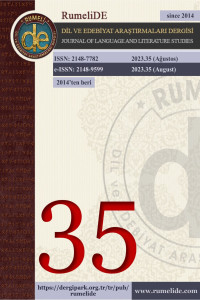Öz
Kaynakça
- “Alice in Translation.” (2015). Such a Curious Dream. Alice’s Adventures in Wonderland at 150. https://library.harvard.edu/sites/default/files/static/onlineexhibits/alice/ Accessed on 26 November 2022.
- Batens, Jan; Mesa-Martinez, Domingo Sánchez. (2015). “Literature in the expanded field: intermediality at the crossroads of literary theory and comparative literature,” Interfaces, 36, 289-304.
- https://journals.openedition.org/interfaces/245#ftn6 Accessed on 25 June 2023.
- Carroll, Lewis. (1990). The complete illustrated Lewis Carroll. Alice’s adventures in wonderland. Kent: Wordsworth Editions Ltd.
- Grenby, M. O. Children’s literature. (2008). Edinburgh: Edinburgh University Press.
- IMDB [International Movie Database]. (2017). Ünal, Ümit. Serial cook. Retrieved July 10, 2023.
- https://www.imdb.com/title/tt5845758/
- IMDB [International Movie Database] (1990). Tözüm, İrfan. Retrieved July 10, 2023.
- https://www.imdb.com/title/tt0427237/?ref_=fn_al_tt_2
- Sanna, Antonio. (2022). “Introduction: Alice and the Critics.” Alice in Wonderland in Film and Popular Culture. Ed. Antonio Sanna. (E-Book).
- ISBN 978-3-031-02215-9 ISBN 978-3-031-02257-9
- https://doi.org/10.1007/978-3-031-02257-9 .
- Sierzputowski, Kate. (2016). Colossal. “150th Aniversary Edition of Alicein Wonderland Features Rare 1969 Salvador Dali Illustrations.” https://www.thisiscolossal.com/2016/09/salvador-dali-alice-in-wonderland-illustrations/ Retrieved on 19 July 2023.
- Van Gennep, Arnold. (1960). The rites of passage. Trans. Monika B. Vizedom and Gabrielle L. Caffee. Chicago: The University of Chicago Press.
Öz
Intermediality is a term to investigate the dialogues between imaginative texts from various types of media. Being a product of postmodern discourse, it has a massive influence on comparative literary studies, in that analyses with regard to intermedial considerations reinforce the impact area of the examined texts. This article aims at analysing Alice’s Adventures in Wonderland (1865) by Lewis Carroll and Serial Cook (2017) by Ümit Ünal in order to show how an old canonical literary work demonstrates itself in a contemporary imaginative text on a cognitive level. It is obvious that artists build up such textual connections on purpose as well, but such an interaction achieved undeliberately, though the receivers of texts can never be confident, is another issue that requires attention. I argue that Serial Cook can be considered as a 21st century reception of AAW in that it exhibits certain aspects of Lewis Carroll’s style and content. It is apparent that the main character, Neslihan becomes a contemporary version of Alice in the face of a serial killer who has difficulties in adjusting to the mechanisms of the community she is part of. Throughout the movie, we see her relentless efforts to speak for herself and settle a new life. Furthermore, in both texts one can observe presence of dream imagery, which appears as an apparatus of initiation of both characters.
Anahtar Kelimeler
Intermediality Serial Cook Ümit Ünal Alice’s Adventures in Wonderland Lewis Carroll
Kaynakça
- “Alice in Translation.” (2015). Such a Curious Dream. Alice’s Adventures in Wonderland at 150. https://library.harvard.edu/sites/default/files/static/onlineexhibits/alice/ Accessed on 26 November 2022.
- Batens, Jan; Mesa-Martinez, Domingo Sánchez. (2015). “Literature in the expanded field: intermediality at the crossroads of literary theory and comparative literature,” Interfaces, 36, 289-304.
- https://journals.openedition.org/interfaces/245#ftn6 Accessed on 25 June 2023.
- Carroll, Lewis. (1990). The complete illustrated Lewis Carroll. Alice’s adventures in wonderland. Kent: Wordsworth Editions Ltd.
- Grenby, M. O. Children’s literature. (2008). Edinburgh: Edinburgh University Press.
- IMDB [International Movie Database]. (2017). Ünal, Ümit. Serial cook. Retrieved July 10, 2023.
- https://www.imdb.com/title/tt5845758/
- IMDB [International Movie Database] (1990). Tözüm, İrfan. Retrieved July 10, 2023.
- https://www.imdb.com/title/tt0427237/?ref_=fn_al_tt_2
- Sanna, Antonio. (2022). “Introduction: Alice and the Critics.” Alice in Wonderland in Film and Popular Culture. Ed. Antonio Sanna. (E-Book).
- ISBN 978-3-031-02215-9 ISBN 978-3-031-02257-9
- https://doi.org/10.1007/978-3-031-02257-9 .
- Sierzputowski, Kate. (2016). Colossal. “150th Aniversary Edition of Alicein Wonderland Features Rare 1969 Salvador Dali Illustrations.” https://www.thisiscolossal.com/2016/09/salvador-dali-alice-in-wonderland-illustrations/ Retrieved on 19 July 2023.
- Van Gennep, Arnold. (1960). The rites of passage. Trans. Monika B. Vizedom and Gabrielle L. Caffee. Chicago: The University of Chicago Press.
Ayrıntılar
| Birincil Dil | İngilizce |
|---|---|
| Konular | İngiliz ve İrlanda Dili, Edebiyatı ve Kültürü |
| Bölüm | Dünya dilleri, kültürleri ve edebiyatları |
| Yazarlar | |
| Yayımlanma Tarihi | 21 Ağustos 2023 |
| Yayımlandığı Sayı | Yıl 2023 Sayı: 35 |


